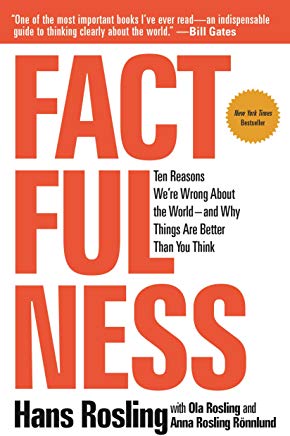

This article is an excerpt from the Shortform summary of "Factfulness" by Hans Rosling. Shortform has the world's best summaries of books you should be reading.
Like this article? Sign up for a free trial here .
Do you have a good handle on the state of the world? Are things worse than ever?
By almost any measure, there’s never been a better time to be alive than right now. That’s the belief of Hans Rosling, Ola Rosling, and Anna Rosling Rönnlund. Their book Factfulness explores the misconceptions that color our view of the world.
Continue reading for several Factfulness questions that will test your knowledge and adjust your thinking.
Factfulness Questions
Whether it’s global poverty, epidemics, war, or terrorism, we tend to have a dramatic, negative view of the world—that things are worse than they’ve ever been and they’re getting worse all the time. But, this view is wrong, says the authors. Factfulness: Ten Reasons We’re Wrong About the World—And Why Things Are Better Than You Think walks us through ten instincts that distort how we understand global problems and offers solutions for overcoming these instincts—turning our dramatic worldview into a factful one.
We’ve organized several knowledge-testing and thought-provoking Factfulness questions into six exercises that you can do individually or with a group.
Exercise #1: Test Your Knowledge
Answer these questions to examine what you really know (and don’t know) about the world.
- In Level 1 countries across the world, what percentage of girls finish primary school?
- A) 10 percent
- B) 60 percent
- C) 40 percent
- D) 30 percent
- Where does the majority of the world’s population live?
- A) High-income countries
- B) Middle-income countries
- C) Low-income countries
- In the last 20 years, the percentage of the world’s population living at Level 1 has:
- A) Doubled
- B) Remained the same
- C) Halved
- D) Tripled
Exercise #2: Question Your Assumptions
Work through these questions to see how the instincts might be misleading you.
- Have you ever been surprised by learning how much you have in common with someone from another culture? Describe the experience.
- Can you think of a negative misconception you once held that turned out not to be true? How can you change your thinking in the future to avoid this?
- Can you describe a real-world example of a statistical trend that didn’t follow a straight line? Explain why you think it followed this course.
Exercise #3: Check Your Misconceptions
Answer these questions to help you challenge your misconceptions.
- What is today’s average life expectancy?
- A) 70 years
- B) 60 years
- C) 50 years
- D) 40 years
- There are 2 billion children in the world today. How many will there be in 2100?
- A) 6 million
- B) 4 million
- C) 2 million
- D) 1 million
- What percentage of the world’s child population is vaccinated?
- A) 30 percent
- B) 40 percent
- C) 50 percent
- D) 80 percent
Exercise #4: Getting the Full Picture
Work through these exercises to help you see what’s really going on.
- Can you think of a recent phenomenon or trend in the news that generated a lot of unnecessary fear? Describe the situation and how you can avoid succumbing to panic in future situations.
- Have you ever made a wrong decision because you only had incomplete data? How can you make better decisions after reading this summary?
- Can you think of a stereotype that you once believed? What caused you to accept this generalization, and how can you adjust your thinking to avoid this going forward?
Exercise #5: Embracing Complexity
Answer these questions to help you move past oversimplifications.
- Why do people at Level 4 think that Level 1 societies can’t change? Knowing what you know now, how can you avoid this misconception?
- Have you ever applied your knowledge or expertise to the wrong situation? How can you apply the lessons of this book to make better decisions in the future?
- Can you think of a historical example of scapegoating? How could people have avoided succumbing to this instinct?
- Have you ever been pressured by a false sense of urgency? Describe the situation.
Exercise #6: Applying Factfulness
Answer these questions to apply factfulness in your personal and professional life.
- What biases or misconceptions do you have that might be inhibiting you from fully understanding the world?
- What are your major knowledge gaps? What do you think you can do to increase your knowledge?
- Are there blind spots and missed opportunities in your organization that are caused by the instincts discussed in this book? How can you help correct this situation?
- Which instinct are you most personally vulnerable to? Applying what you’ve learned, describe strategies you can use to overcome this.
———End of Preview———

Like what you just read? Read the rest of the world's best summary of Hans Rosling's "Factfulness: Ten Reasons We're Wrong About the World" at Shortform . Learn the book's critical concepts in 20 minutes or less .
Here's what you'll find in our full Factfulness summary :
- Why we evolved to be negative, and why it's terrible for us today
- Surprising statistics about how people die - from plane crashes to swine flu
- How the world isn't nearly as poor as you think it is
- How to think smarter about the world, and the rest of life






